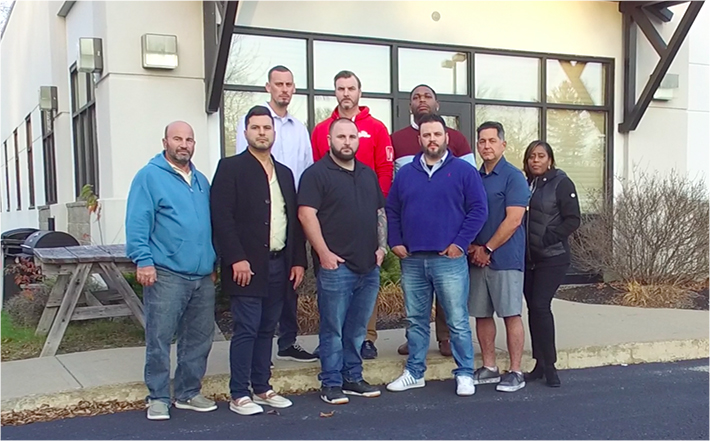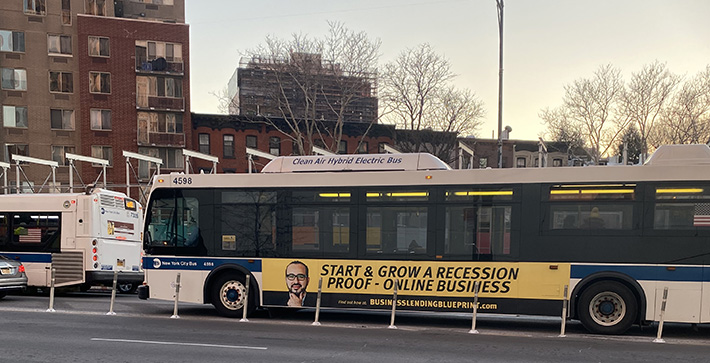Business Lending
Bitty Advance’s New Suite
February 22, 2022 Bitty Advance hopes that an enticing in-person environment will bring people back to the office. As part of that, the company recently moved into a new space.
Bitty Advance hopes that an enticing in-person environment will bring people back to the office. As part of that, the company recently moved into a new space.
“We want to give our team both the flexibility of working from home and having a premier office space for collaboration,” Bitty Principal and CEO Craig Hecker told deBanked. “…making our space open and dynamic, with comfortable couches, TVs, and relaxed meeting areas was important, we are also incorporating fun things like resting areas and table tennis to promote wellness and engagement.”
The new office is immediately adjacent to Dania Pointe, a 102-acre premier mixed-use development with almost one million square feet of retail and restaurants, luxury offices, hotels, luxury apartments, and public event space.
Bitty is seeking to acquire tech talent in many areas as they expand platform offerings for their white-label application intake process, affiliate online checkout referral page, payment processing & management interface, and self-service customer portal.
“Bitty is a tech company first. All of our focus is on utilizing technology to revolutionize the MCA space,” said Hecker.
Não é bom: When Split-Payment Business Loans Fail
February 20, 2022 As tech companies like Square and Shopify capitalize on their respective abilities to collect loan payments from borrowers by withholding a percentage of their credit card sales, similar companies have replicated that model across the world. StoneCo, for example, which is traded on the Nasdaq but operates in Brazil, had a market cap last year of over $25 billion. More recently, however, it’s dropped to nearly $3 billion.
As tech companies like Square and Shopify capitalize on their respective abilities to collect loan payments from borrowers by withholding a percentage of their credit card sales, similar companies have replicated that model across the world. StoneCo, for example, which is traded on the Nasdaq but operates in Brazil, had a market cap last year of over $25 billion. More recently, however, it’s dropped to nearly $3 billion.
In Brazil, StoneCo used its wide reaching payment business to start originating small business loans that were paid back through their customers’ credit card sales. That business seemed to hold up quite well early on in the pandemic but then took a turn for the worse. According to Bloomberg, distressed businesses came up with ways to circumvent their payments. “…[B]usinesses started jumping to other payments firms, meaning Stone no longer had access to their card purchases,” it said.
“Lockdowns pressured businesses’ cash flows and several sought ways to not pay back their loans,” StoneCo CEO Thiago Piau said.
Historically, diverting sales through another payment processor to avoid this type of obligation was known as “splitting.” It’s an inherent risk to finance companies that make underwriting decisions based on the assumption that the customer is unable to exit the relationship without seriously disrupting its business.
StoneCo was hit so bad that it stopped lending altogether and a significant percentage of its customers went into default. In the company’s Q3 2021 earnings call, Chief Strategy Officer Lia Matos said that they intend to get back into lending again but with some adjustments.
“So, those improvements are, for example, the inclusion of personal guarantees from the business owners and potentially other business they may have, improve risk scoring through additional data,” said Matos.
Covid may have been less damaging to similar companies in the US like Square, for example, because Square was able to repurpose itself to a PPP lender. The incentive to move to another payments platform may have been diminished by the allure of leveraging a pre-existing relationship to secure PPP funds.
StoneCo in Brazil is an example of what can happen to a fintech lender reliant on recouping credit card sales when that relationship doesn’t stick.
To help ensure the team gets things right in the future, StoneCo recently acquired Gyra+. Described as “a data-driven SME lender, which operates under a fee-based, asset-light approach,” the company plans to gently ease back into lending.
“I think that we are not ready to provide a specific guidance in terms of scaling the credit,” said CEO Thiago Piau in November. “We are really focused toward engineering and getting the feedback of clients and all the clients’ experience that we have learned throughout this.”
Brazil has a population of 212 million people.
Reality Show About SMB Finance Sales Rockets to The Top Spot
February 20, 2022 Four aspiring equipment finance brokers traveled to Rochester, New Hampshire last November to get a hands-on sales training from the management team at Everlasting Capital. With a variety of backgrounds and dreams of turning commercial finance sales into a lucrative career, each trainee wasn’t sure what they were in for when a team of mentors and a film crew awaited them inside.
Four aspiring equipment finance brokers traveled to Rochester, New Hampshire last November to get a hands-on sales training from the management team at Everlasting Capital. With a variety of backgrounds and dreams of turning commercial finance sales into a lucrative career, each trainee wasn’t sure what they were in for when a team of mentors and a film crew awaited them inside.
That’s the basis for Equipping The Dream, a deBanked TV produced web-based reality show that debuted on February 15th. The six-episode show is dropping twice a week until the finale scheduled for March 3rd.
Over the weekend, Episode 1 of the show became the most visited page on deBanked in 2022 so far.
“There’s never been anything like this about the industry,” said Executive Producer Sean Murray. “We did a screening of it for some people who had nothing to do with sales or finance and they were captivated by it.”
 Partners Josh Feinberg and Will Murphy were already well-known throughout the industry. The two were featured in a 2018 deBanked story that explains how their journey began years earlier in a pawnshop basement. Since then, the pair now also run Equipment Broker School, a training course for aspiring brokers.
Partners Josh Feinberg and Will Murphy were already well-known throughout the industry. The two were featured in a 2018 deBanked story that explains how their journey began years earlier in a pawnshop basement. Since then, the pair now also run Equipment Broker School, a training course for aspiring brokers.
The sales tips and experience in the show, therefore, are as real as it gets. Viewers have shared what they thought of the first two episodes out so far:
“It was inspiring to see other people doing what I’m doing.”
“Awesome production!”
“This is getting good! COLD CALLERS watch this!!!!”
“This did not disappoint.”
“Your camera quality is better than most shows on Netflix.”
“I’m rooting for these brokers to succeed.”
“Now that’s reality!”
Episode 3 will be released on Tuesday, February 22nd. The four trainees range in ages 35-50. The show is exclusively on deBanked TV.
Pick a Niche or Go Far and Wide? SMB Financiers Weigh in
February 18, 2022 As big tech continues to pave the way for new avenues for providing capital for small businesses, the legacy infrastructure in place has their own ideas of how to compete in funding a digitally native business owner. While some say that the strength is in finding a niche, others disagree— claiming that the key is to expand business, avoiding a one-dimensional aspect of funding. On top of this, some commercial finance brokers even claim that an ability to handle digital assets will give them an advantage over a larger tech company, too.
As big tech continues to pave the way for new avenues for providing capital for small businesses, the legacy infrastructure in place has their own ideas of how to compete in funding a digitally native business owner. While some say that the strength is in finding a niche, others disagree— claiming that the key is to expand business, avoiding a one-dimensional aspect of funding. On top of this, some commercial finance brokers even claim that an ability to handle digital assets will give them an advantage over a larger tech company, too.
“Finding the niche as far as who you’re funding, and what type of deals you’re funding, will lead to continuing growth,” said Matt Rojas, Senior Lending Officer at Ironwood Finance. While Rojas believes the strength of a smaller brokerage is the ability to service a niche client, he expressed the idea that larger companies getting into the space are going too deep too quickly—resulting in an unsustainable rate of expansion.
“I see the biggest problem with the fly-by-night brokers, these bigger MCA shops that you’re seeing entice brokers to send the clients to them,” Rojas said. “I don’t see how that will sustain long term unless they continue to meet milestones to acquire their capital. I just had a merchant [get] bought out from our firm [by another funder] for over 40K plus, [but] their cash flow could only sustain an 18K MCA max. I’ll never understand how these firms are going to operate on a larger scale unless they are bought by the big firms.”
Other people in small business lending think that the strength is to offer a variety of financial products and options to give merchants choices. “The only way to keep up with the big boys of the industry is to simply just not be a one-trick pony,” said Juan Caban, Managing Partner at Financial Lynx. “Just like they are adapting into new markets and products, we as lenders and brokers need to also enhance our offerings.”
 While people like Caban are molding products based on the competitive flow of the industry, Rojas seems to believe the system will bleed the big players dry. “It’s my understanding that as a lender we don’t need to compete with each other on rates like you’re seeing,” Rojas said. “I believe they call this the cash burn stage.”
While people like Caban are molding products based on the competitive flow of the industry, Rojas seems to believe the system will bleed the big players dry. “It’s my understanding that as a lender we don’t need to compete with each other on rates like you’re seeing,” Rojas said. “I believe they call this the cash burn stage.”
“They’re going to burn as much cash to acquire clients,” Rojas continued. Then, the dominos fall. […] It’s like a story that paints itself over and over again. The same thing will happen to these bigger firms you mentioned due to the simple fact that their underwriting process doesn’t factor NSFs, non-repayments, or defaults.”
While Rojas focused on what the bigger companies are doing, Caban spoke on what brokers can do on the fly to adjust. He expanded on the idea of using old tactics in new ways, saying that traditional sales tactics may work if implemented with a well-researched and modern spin.
“Before cold calling, research and understand who your target market is and be prepared,” Caban said. “When cold calling, no one merchant has similar needs and goals. We need to ask the right questions, learn about the business, then find customized solutions that are in line with their financial needs and goals.”
A merchant will always appreciate a broker or lender who takes an interest in their business and find solutions that are in line with their goals rather than [their own] financial interests.”
Some brokers have gone outside of the box when it comes to how they will compete in the future of small business lending, saying that traditional currencies have been won over by big tech, and it’s digital assets that will open a brand new market for the next-generation small business lender.
“Since 2008, technology has changed a lot more than just the process in which small business owners find and acquire funding,” said Nicholas Saccone, Senior Funding Advisor at Proto Financial. “As you know, cryptocurrency is becoming more and more mainstream by the day with the Fed scrambling to get control over it. Whether you believe in crypto or not, it will [change] the way we see money.”
Saccone expressed that brokers who embrace learning about digital assets will not only be able to compete with large tech lenders, but beat them out.
“PayPal, DoorDash, and Square can make it easy for companies to secure fiat currency, but as crypto becomes more mainstream, brokers will fulfill a new role as they help educate clients on the new financial system that is upon us,” Saccone said. “It will be physically impossible for large tech companies to integrate crypto into their current systems without brokers doing the dirty work.”
“Mass adoption comes from the top down,” Saccone continued. “Digital collateral tokens, such as Flexa’s AMP, will change the payment processing industry forever. Transactions will become instant and it is my belief within the next ten years, merchants will be utilizing digital assets more than fiat cash.”
Shopify Capital Originated $324M in Funding in Q4
February 16, 2022 Shopify Capital originated $324M in Q4 2021, bringing the full-year total to $1.39B. That figure represents a massive increase over the company’s previous originations record of $794M in 2020.
Shopify Capital originated $324M in Q4 2021, bringing the full-year total to $1.39B. That figure represents a massive increase over the company’s previous originations record of $794M in 2020.
During the quarterly earnings call, Shopify CFO Amy Shapero listed Shopify Capital among the divisions that drove revenue growth for the company in 2021.
“As merchants build momentum, inventory and marketing needs to grow alongside it,” said Shopify CEO Harley Finkelstein. “And this is where Shopify Capital comes in, offering merchants the funding they need to expand their business.”
Total originations came in just shy of the numbers that rival OnDeck reported a week earlier. OnDeck originated $1.76B in funding to small businesses in 2021.
Wait, Was That Oz Konar On The Side Of That Bus?
February 16, 2022 An MTA bus traveling past Barclays Center on Brooklyn’s Flatbush Avenue this week showcased an ad for Oz Konar’s Business Lending Blueprint, a popular industry loan-brokering school. With brokers increasingly trying to leverage social media by creating online personas that represent them and their businesses, it seems there is definitely a money-making opportunity in leveraging that image into the justification for a broker learning platform.
An MTA bus traveling past Barclays Center on Brooklyn’s Flatbush Avenue this week showcased an ad for Oz Konar’s Business Lending Blueprint, a popular industry loan-brokering school. With brokers increasingly trying to leverage social media by creating online personas that represent them and their businesses, it seems there is definitely a money-making opportunity in leveraging that image into the justification for a broker learning platform.
“Not long ago, that was me commuting on those buses and subways in New York City when I had a corporate job,” said Konar, when asked about what it means to him to have his face on the side of a bus. “I was in New York City one day and I said we need to increase the awareness of the potential, because I wish someone brought the opportunity to me back then.”
Konar believes that New York City commuters are a great target audience for his business lending blueprint. “It gets exhausting getting on an off those buses and subways and all that,” he said. “People are always thinking of ways to enhance their lives and their incomes.”
As remote and hybrid work situations have become incentivizing tools for landing employees in a labor-starved market, the idea of getting a ‘business in a box’ from a program like Konar’s is an opportunity that many jobseekers may find too good to pass up.
And it’s not just one bus doing a loop on Flatbush Avenue. Konar says his ad is plastered on 250 buses across the five boroughs of New York City.
“You’re not going to just figure it out on your own,” said Konar, when asked how accessible the idea of building a business centered around small business financing is for the everyday commuter. “Most people don’t even know the existence of this industry, they’re not thinking about it. They’re thinking about crypto, or an Amazon business, or no-money-down real estate investing, they’re not thinking about alternative lending. I think that’s the advantage.”
Konar’s got a pretty large following already. His guest appearance on a deBanked live stream last year was one of the most watched videos on deBanked in all of 2021, second only to an interview with Miami Mayor Francis Suarez.
You can watch Konar’s recent interview backstage at Broker Fair 2021 here.
NJEDA Approves Grants to Support Micro Business Lenders
February 16, 2022 Last week, the New Jersey Economic Development Authority (NJEDA) endorsed the construction of the Main Street Lenders Grant.
Last week, the New Jersey Economic Development Authority (NJEDA) endorsed the construction of the Main Street Lenders Grant.
Eligible micro business lenders will be offered up to $1 million that can be used to create new lending products or as supplemental funding for existing products. The Main Street Lenders Grant is the third product the NJEDA plans to launch under the Main Street Recovery Program. The $100 million small business support program was created under the Economic Recovery Act of 2020 (ERA) and was signed by Gov. Phil Murphy in January of 2020.
The technical assistance grant will support those who qualify with the costs associated with providing technical assistance to micro businesses, aiding these businesses to qualify for loans. The maximum grant one can receive is 50 percent of their lending grant amount (not to exceed $500,000).
The second product under the Main Street Recovery Program is the Small Business Improvement Grant, with applications now open as of Thursday. This product will reimburse eligible small businesses and nonprofits for up to 50 percent of eligible project costs associated with building improvements or purchases.
“Small businesses are the backbone of New Jersey,” stated Governor Phil Murphy. “This program will allow small businesses and nonprofits throughout our state to make the investments necessary for their success and for improvements to their spaces.”
Members of Congress Petition Biden For More Small Business COVID Relief
February 11, 2022 Members of Congress are urging Biden to pass a targeted small business relief package for industries that were hit the hardest by the Omicron Surge. Programs such as the Restaurant Revitalization Fund and Shuttered Venue Operators Grants program are being pushed to reopen. Businesses that did not receive initial funding and those that need a second round of funding would both be eligible.
Members of Congress are urging Biden to pass a targeted small business relief package for industries that were hit the hardest by the Omicron Surge. Programs such as the Restaurant Revitalization Fund and Shuttered Venue Operators Grants program are being pushed to reopen. Businesses that did not receive initial funding and those that need a second round of funding would both be eligible.
It is further being asked that at-risk sectors centered on in-person gatherings be made eligible for federal assistance. This includes travel and fitness industries and businesses that offer indoor recreation and group activities.
The petitioners are concerned with two things: (1) that a surge in business closures may aggravate the high prices that communities are already facing and (2) That reduced in-person gatherings may have led to a large number of business closures and that a post-Omicron demand for them in the spring in company with significant new supply constraints is an issue that could arise.
The last request made was that the American Rescue Plan’s tax credits available to small businesses to cover earned sick leave benefits for employees affected by COVID-19 be extended.
Two other popular relief programs, PPP and EIDL, have already wound down. The EIDL program just came to a close at the end of January.





























